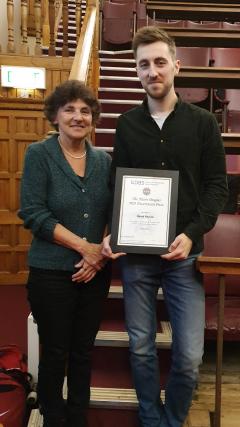Alison Douglas Prize for the Best PhD Thesis 2018/19
The Centre for Discovery Brain Sciences is delighted to announce the winner of the Alison Douglas Prize for the best PhD thesis for 2018/19 has been awarded to Dr David Munro for his thesis on 'Mechanisms of kidney vascularisation and the roles of macrophages in renal organogenesis'.

David was presented his prize by Prof Marian Joels who was the invited speaker for the Mary Pickford lecture on Thursday 26th September. The panel members were impressed by the quality of Dr Munro's thesis and the recognition of his PhD work in peer reviewed papers.
David has also been awarded the Beddington Medal from the British Society for Developmental Biology for his PhD work in the Davies lab.
What, Where, How?
Kidneys are specialised organs that clean the blood, removing waste while retaining what is useful. This requires a complex vasculature, and its formation as a foetus develops is poorly understood. I started my PhD research by using advanced microscopy techniques to visualise how blood vessels form in three-dimensions in the mouse kidney. In doing so, I identified when and from where the first blood vessels enter the kidney, and how blood vessels pattern at the edge of the kidney throughout development.
Blood vessels can form through angiogenesis (branching of new vessels from pre-existing ones) and/or vasculogenesis (assembly of new vessels from the coalescence of endothelial precursor cells). It has long been thought that a combination of both processes occurs during kidney vascularisation; however, my thesis work indicates that this concept may not be correct. My data instead suggest that kidney vascularization relies on growth and remodelling of pre-existing vessels (angiogenesis) and does not depend on vasculogenesis at any point.
I then focused on the blood vessels at the edge of the kidney, which I found to consistently and accurately pattern around a special collection of cells – the cap mesenchyme. The cap mesenchyme contains cells that eventually become the cleaning tubes of the kidney, the nephrons. This cell population undergoes rounds of splitting at the kidney’s periphery. As this happens, I demonstrated that blood vessels migrate through the newly opened regions between the separating cap mesenchymal populations. This occurs in cycles throughout development and is likely to be vital for the oxygenation of the kidney’s outer region, the site where important processes such as nephron formation take place.
Shifting focus
I next shifted my research focus towards a specialised cell type known as the macrophage (macro = big; phage = eater) in the developing kidney. Macrophages are immune cells best known for clearing foreign and damaged cells. These cells have vital roles during animal development, but little is known about their specific functions during kidney development.
Big eaters
Macrophages arrived in the mouse kidney early during its development, where they were required to clear away misplaced cells to ‘set-the-stage’ for early kidney development. Throughout later development, most macrophages wrapped around blood vessels and I demonstrated their ability to eat endothelial cells (which usually line the blood vessels) and red blood cells (which are carried within them) within the kidney. I also established that kidney macrophages produced many molecules linked to blood vessel development, and so I examined the consequences of macrophage-loss on blood vessel formation. Blood vessels normally form continuous networks in the kidney; however, when macrophages were depleted (by blocking a macrophage-survival signalling pathway), connections between renal blood vessels were reduced.
The really impressive thing about David’s work is that he did not come to my lab to fit in with an existing line of research but created one of his own
Congratulations David, we wish you all the best for your future career!
Further information
David Munros peer-reviewed papers
- Cycles of vascular plexus formation within the nephrogenic zone of the developing mouse kidney
-
Asymmetric BMP4 signalling improves the realism of kidney organoids
- Refuting the hypothesis that semaphorin-3f/neuropilin-2 exclude blood vessels from the cap mesenchyme in the developing kidney
- The Origins and Functions of Tissue-Resident Macrophages in Kidney Development
- Vascularizing the kidney in the embryo and organoid: questioning assumptions about renal vasculogenesis
- Macrophages restrict the nephrogenic field and promote endothelial connections during kidney development

